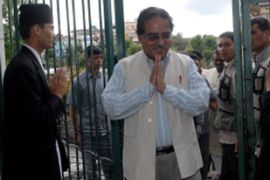Nepal set to appoint new PM
Country’s assembly begins casting votes with Maoist leader widely expected to win.

The Maoist ex-rebels, who fought for a decade to oust the king and overturn what they saw as a feudal structure, say they have enough support in the new assembly to form a government and implement their reforms.
Born into a high-caste but poor farming family, Prachanda – whose real name is Pushpa Kamal Dahal – has said he was driven to politics by the extreme poverty he witnessed in rural Nepal.
He led the Maoists in a decade-long armed conflict before signing the peace deal with mainstream political parties in 2006, after Gyanendra, the former king, was forced to end a period of authoritarian direct rule in the face of massive protests.
Girija Prasad Koirala, the interim prime minister, who is seen by many as the architect of the 2006 peace deal that ended the civil war, was preparing to leave his official residence, a member of his staff confirmed.
“He is packing his bags and will leave Friday afternoon,” said Shekhar Thapa, the prime minister’s secretary.
In elections in April, the Maoists won the largest number of seats in the constitutional assembly but fell short of a majority – requiring them to strike deals with other parties.
The Maoists have allied themselves with the centre-left Unified Marxist-Leninist party and the Madheshi Janaadhikar Forum to ensure Prachanda will be named as Nepal’s new premier.
‘Strong opposition’
“The alliance… has made it certain Prachanda will become prime minister as they’ll easily get the votes needed for a simple majority,” said Kundan Aryal, editor of Himal, a weekly news magazine.
Congress, led by Koirala, said it will not participate in the new government if it is defeated.
“There’s no question of joining a Maoist-led government if our candidate is defeated,” said Arjun Narsingh Khatri Chettri, a Congress spokesman.
“We’ll stay in the opposition and play a constructive role so the peace process remains on track.”
Nepal has been without a proper government since April 28, when the assembly voted to sack Gyanendra and abolish the monarchy.